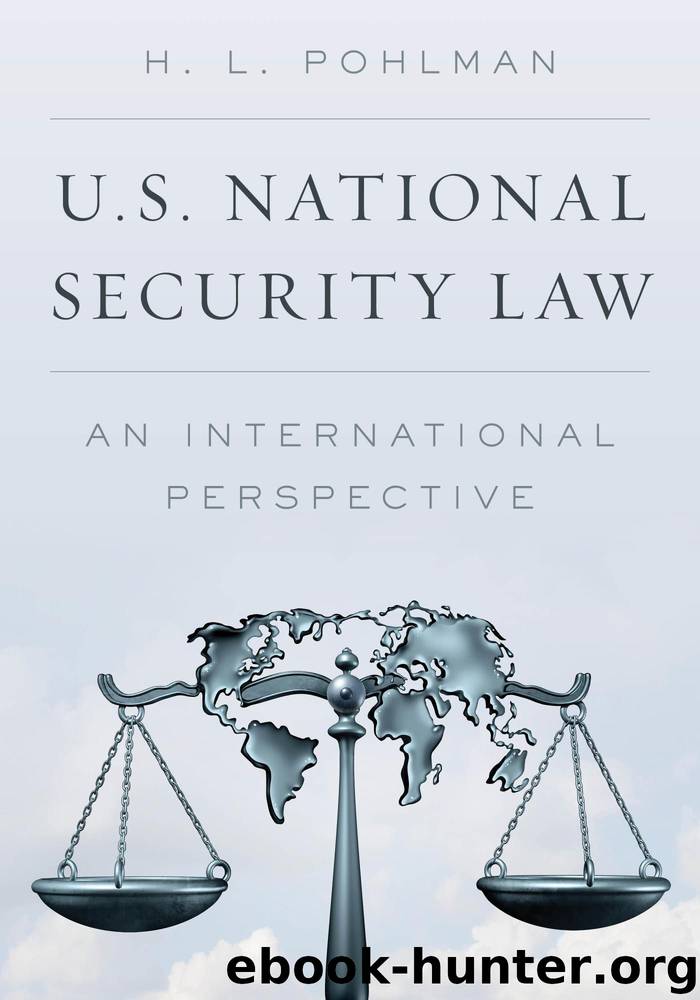U.S. National Security Law by H. L. Pohlman

Author:H. L. Pohlman
Language: eng
Format: epub
Published: 2018-09-21T16:00:00+00:00
During the Civil War, over two thousand military commissions tried an assortment of ordinary criminals and violators of the laws of war, but most of these trials took place in border states where martial law was declared or in occupied Southern states, thereby producing some confusion regarding whether specific commissions were martial law courts, military occupation courts, or law-of-war courts. 4 Military commissions were also used in the wars with Native American Indians, including the Dakota War of 1862, which resulted in the trial and execution of thirty-eight Indians for violations of the laws of war. In addition, during the Philippine-American War (1900–1901), military commissions, conducting themselves generally in accordance with court-martial rules and procedures, tried nearly eight hundred Philippine nationals for law-of-war violations. 5 During these conflicts, military commissions that tried enemies who allegedly violated the laws of war gradually became a definite and distinct type of military commission—one not to be confused with a military commission authorized under military occupation or martial law. Violators of the laws of war were perceived to be a separate group of culpable individuals because they had violated the legitimate and valid norms of international law. This attitude was reflected in the Treaty of Versailles, which brought World War I to an end in 1919. Article 228 of the treaty recognized the right of the allies to try Germans accused of violating the laws of war before their domestic military tribunals and to punish such individuals if they were found guilty. 6 This article enshrined in an international treaty the principle that state parties could lawfully use domestic military tribunals to try and punish violators of the laws of war.
Despite these provisions of the Treaty of Versailles, only France and Belgium chose to prosecute Germans for war crimes, but their efforts were stymied because Germany, in violation of its treaty obligations, refused to hand over suspected war criminals for trial. Instead, Germany offered to try suspected German war criminals in German courts: the so-called Leipzig trials. However, only a handful of Germans were tried at Leipzig; only a few were convicted; and only a couple served light sentences (less than one year’s imprisonment). Nevertheless, the Leipzig trials reaffirmed the principle that violators of the laws of war were individually responsible for their conduct, thereby buttressing the Versailles principle that a state party to a conflict can try alleged enemy war criminals before domestic military tribunals.
In 1942, in the middle of World War II, the United States endorsed the Versailles principle by prosecuting eight German soldiers who traveled to the United States by submarine, landed on beaches, buried their military uniforms, and entered the country illegally, presumably for the purpose of committing espionage. Under the authority of a proclamation issued by President Roosevelt, the German soldiers, including one who had dual U.S.-German citizenship, were tried in Washington, D.C., before a military commission for “spying,” “attempting to give intelligence to the enemy,” “violating the law of war,” and “conspiring” to commit the first three offenses.
Download
This site does not store any files on its server. We only index and link to content provided by other sites. Please contact the content providers to delete copyright contents if any and email us, we'll remove relevant links or contents immediately.
| Arms Control | Diplomacy |
| Security | Trades & Tariffs |
| Treaties | African |
| Asian | Australian & Oceanian |
| Canadian | Caribbean & Latin American |
| European | Middle Eastern |
| Russian & Former Soviet Union |
The Secret History by Donna Tartt(16622)
The Social Justice Warrior Handbook by Lisa De Pasquale(11489)
Thirteen Reasons Why by Jay Asher(7788)
This Is How You Lose Her by Junot Diaz(5770)
Weapons of Math Destruction by Cathy O'Neil(5036)
Zero to One by Peter Thiel(4824)
The Myth of the Strong Leader by Archie Brown(4789)
Promise Me, Dad by Joe Biden(4447)
Beartown by Fredrik Backman(4415)
Stone's Rules by Roger Stone(4415)
How Democracies Die by Steven Levitsky & Daniel Ziblatt(4398)
The Fire Next Time by James Baldwin(4342)
100 Deadly Skills by Clint Emerson(4076)
A Higher Loyalty: Truth, Lies, and Leadership by James Comey(4032)
Rise and Kill First by Ronen Bergman(4012)
The David Icke Guide to the Global Conspiracy (and how to end it) by David Icke(3881)
The Farm by Tom Rob Smith(3872)
Secrecy World by Jake Bernstein(3782)
The Doomsday Machine by Daniel Ellsberg(3730)
